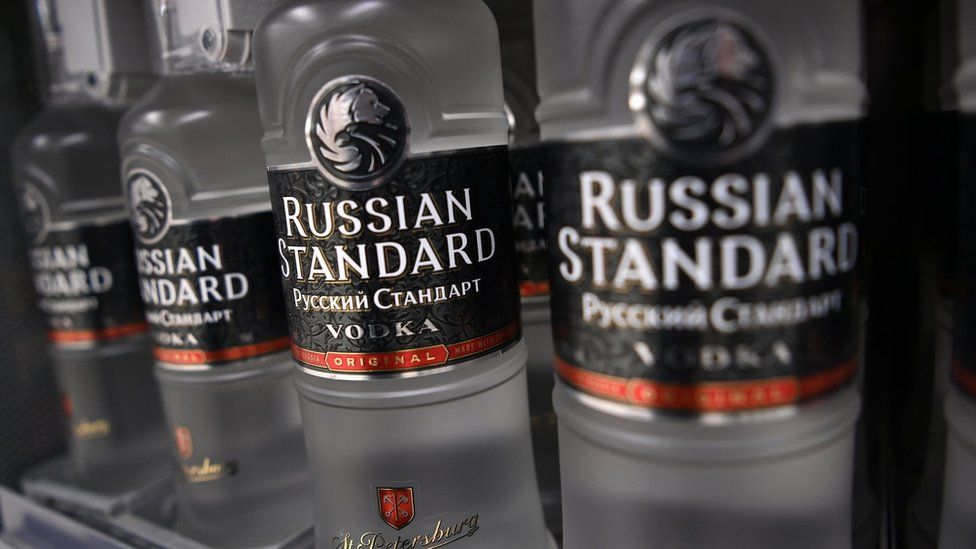US President Joe Biden has announced a ban on imports of Russian diamonds, seafood and vodka in the latest response to Russia’s war in Ukraine.
The US, European Union and other allies also plan to revoke Russia’s status as an equal trade partner, paving the way for further economic punishment.
The moves add to sanctions that have isolated Russia economically since the invasion.
Its currency has collapsed, while global firms rush to exit the country.
Russian President Vladimir Putin has likened Western sanctions on banks and oligarchs to a declaration of war. Moscow has also threatened to nationalise production plants or factories where work has been suspended.
Western allies announced further economic retaliation on Friday,
As well as the US moves, the European Union said it would ban imports of key Russian iron and steel products, bar new energy investments in the country and cut off exports of luxury goods to Russia, while the UK put sanctions on hundreds of Russian politicians.
Mr Biden said the latest steps will be “another crushing blow to the Russian economy”.
Revoking ‘most favoured nation’ status
Under international rules, designating a country a “most favoured nation” provides reciprocal trade privileges such as lower tariffs, taxes imposed at the border.
Stripping Russia of that status clears the way for higher tariffs on key products it sells such as mineral fuels, fertilisers and metals.
Mr Biden said he was coordinating the plans with the European Union and other advanced economies, including Canada and Japan, each of which will take similar steps.
In the US, Congress, which must act for the move to go into effect, has already declared itself in favour of the move.


Most Favoured Nation (MFN) is a status conferred by membership of the World Trade Organisation. It might sound as though it confers special advantages, but that’s not really the case.
In fact, it is a baseline designed to ensure all World Trade Organisation members are treated equally, unless they are members of a specific free trade area or agreement. Under normal circumstances, it limits countries’ ability to impose trade barriers against one another – or offer individual countries special concessions.
By removing this status from Russia, G7 countries will be able to target its exports with punitive tariffs, or taxes. In fact one of them, Canada, has already done so. Last week it imposed tariffs of 35% on all products coming from Russia and its compliant ally, Belarus.
In order to do this, Canada relied on an exemption contained in one of the WTO agreements, which allows members to take action they consider necessary to protect their “essential security interests”. It is likely the others will do the same.

In addition, Western allies said they planned to cut Russia off from accessing finance from international organisations such as the World Bank and International Monetary Fund.
“Russia cannot grossly violate international law and expect to benefit from being part of the international economic order,” the G7, a group of seven advanced economies including the UK, said in a statement.
Mr Biden said he was also barring US exports of luxury goods to Russia, trade worth about $550m per year, and would further sanction oligarchs and their families.
The US ban on key Russian imports will deny Mr Putin more than $1bn in revenue, the White House said.
That is just a fraction of the roughly $28bn worth of trade the US and Russia exchanged in 2019.
“We’re going to continue to squeeze Putin,” Mr Biden said. “He is the aggressor and… must pay the price.”
Economists say the sanctions will throw Russia into a severe economic recession this year. But it is not clear that the economic disarray has altered Mr Putin’s military ambitions.
At a press conference on Thursday, White House spokeswoman Jen Psaki was asked when the weight of the sanctions might lead to a change in Mr Putin’s actions.
“Our objective of course is to bring an end to this conflict, she said. “In terms of when that will happen, I’m unfortunately not in the mind of President Putin…. When it will change his calculus, I can’t give a prediction of that.”

War in Ukraine: More coverage
- LIVE: Latest updates from on the ground
- WATCH: On the front line with Ukrainian soldiers
- IMAGES: Scale of destruction in Mariupol revealed
- WAR CRIMES: Could Putin be prosecuted?
- IN DEPTH: Full coverage of the conflict






























